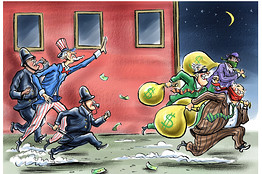Students in economics will have two opportunities next Monday to hear and interact with Yoram Bauman, self-styled standup economist, who specializes in not only making the complex accessible but also humorous.
Students in Econ 280 and Econ 320 will hold a joint session on Monday morning at 9:50 in Science Hall 102. Other students are welcome to attend. Bauman will discuss Paul Krugman’s recent article ( here ) in the New York Times Magazine entitled “Building a Green Economy.”
Bauman will also be the second speaker in the Povolny Lecture Series on The Climate for Climate Change. His talk is entitled “Comedy, Economics, and Climate Change” and will take place in the Wriston Auditorium at 7:30 PM next Monday.
To get a snippet of his style or to see excerpts from his new Cartoon Introduction to Economics go here.
 In today’s Wall Street Journal, Gerald O’Driscoll spells out on how theft and fraud have become commonplace. This is not a new story but a growing phenonmenon. The Goldman-Sachs and Lehman cases show how pervasive things are. The cartoon tells it all.
In today’s Wall Street Journal, Gerald O’Driscoll spells out on how theft and fraud have become commonplace. This is not a new story but a growing phenonmenon. The Goldman-Sachs and Lehman cases show how pervasive things are. The cartoon tells it all. Former Ambassador to India and US Under Secretary of Treasury David Mulford ’59 will be on campus next Tuesday, April 13th , and students will have two major opportunities for interaction:
Former Ambassador to India and US Under Secretary of Treasury David Mulford ’59 will be on campus next Tuesday, April 13th , and students will have two major opportunities for interaction:
